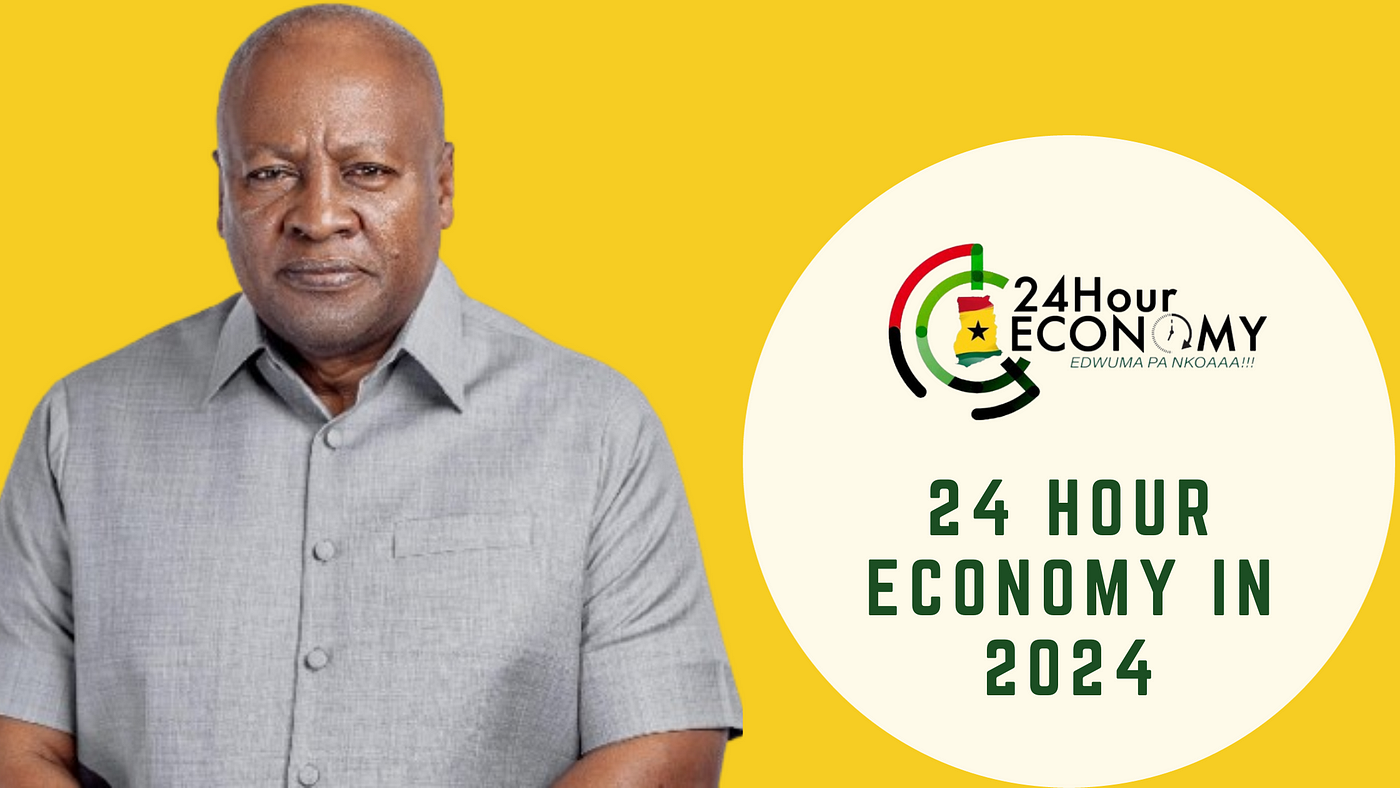It is hard to describe what a thunderbolt to public opinion was John Dramani Mahama’s plan to turn around Ghana’s economy. The 65 year old served as the nation’s president between 2012 and 2017 and is set to run again this December with the backing of the National Democratic Congress (NDC). If elected, Mr. Mahama pledges to introduce a 24-hour economy which will radically reshape the business and economic environment in the country.
We can suspect some of Mr. Mahama’s advisors were not altogether pleased with the audacious proposal since it runs counter to a typical electoral strategy. When you’re campaigning from the opposition, the safest way to score points with the electorate is promising the moon while criticizing those in power and such a strategy would have been a walk in the park since after 8 years of a Nana Akufo-Addo administration the country is rushing headlong towards economic collapse.
Due to the current government’s mismanagement and corruption, the once promising West African nation now struggles with inflation and unsustainable levels of public debt. Only last year Ghana was forced to secure a bailout from the International Monetary Fund (IMF) after its national debt ballooned to $55 billion. In practice this meant that more than 70% of the government’s revenue went to servicing the debt. Though inflation is down from a high of 54% in 2022, it still stubbornly hovers near the 25% mark. A World Bank report last year estimated that 850,000 Ghanaians have drifted into poverty because of this erosion of their purchasing power.
Given this state of affairs it would seem like common sense for Mr. Mahama to take a seat back, grab the popcorn and watch how the governing New Patriotic Party (NPP) goes down in flames in this year’s election. Instead we got a program that is reminiscent of Winston Churchill’s first speech as prime minister during World War II – it offers the nation nothing but blood, toil, tears and sweat.
The 24-hour economy is based on the experience of countries like South Korea and plans to generate export-oriented growth by maximizing the output of economic, human and institutional resources. Under this vision, businesses will operate in three shifts, seven days a week, 52 weeks per year. The change is anticipated to create new employment opportunities, reduce youth unemployment and increase living standards. John Mahama, if elected, promises to offer tax incentives and to enact new labor laws to support the around the clock business operation.
The COVID-19 pandemic conclusively proved the viability of remote work, and this flexibility will be key to developing Ghana’s burgeoning service sector. With a young and relatively skilled labor pool, the economy stands to greatly benefit from increased workforce participation and a realignment of business practices and attitudes about employment. The additional tax revenue will enable the government to chip away at the public debt, which will in turn further expand the state’s spending power by reducing the cost of interest, thus generating a positive feedback loop.
At least this is the theory. But is Mr. Mahama’s 24-hour economy just a fairy tale, or could it be a workable model for breaking out from the economic rut caused by eight years of NPP governance?
Paradoxically, the nearly 40% of Ghanaians employed in agriculture will be among the least disrupted by this ambitious project. After all, farmers wake up at the crack of dawn 365 days a year. Workers in mining, oil and gas sectors, transport, IT, communications, will likewise find little to grumble about since their activity already runs in three shifts per day. The opposition to the 24-hour economy is likely to arise from among the ranks of government bureaucrats and public sector workers.
In Ghana, the government is the largest employer, primarily in the fields of education, healthcare and security, with almost half of the nation’s budget being spent on wages. Public services employees have also been historically among the main beneficiaries of electoral freebies. In the 2016 election, then President John Mahama lost to Nana Akufo-Addo partly because of a decision to scrap allowances for trainee nurses and teachers two years earlier. One of the first acts of the new Akufo-Addo government was to reinstate the suspended allowances.
Besides opposition from entrenched interests, lack of infrastructure and corruption will also place limitations on the success of the 24-hour economy. A higher number of companies with increasing cash flows, together with large-scale infrastructure projects, may prove difficult to monitor impartially and transparently by a class of public servants already prone to graft. To mitigate this, Ghana will have to rely on its traditional strengths: a robust civil society and a free press that is the envy of even Western nations.
Mass media is called the watchdog of democracy and if John Mahama finds a way to ally himself with the right anti-corruption NGOs and media outlets, it may prove enough to counterbalance existing government structures. Ultimately success or failure of the plan hinges on whether a large enough share of the population can be persuaded to share in the vision or whether private interest and nepotism will triumph over the public good once again.
“Toil and tears” and “it will get worse before it gets better”, these are two highly improbable electoral slogans that might well stand for John Mahama’s current presidential bid. The 24-hour economy aims to turbocharge economic activity by asking the people to work more and work smarter and, if successful, it will turn Ghana into an example to other countries in the region: a democratic state with a vibrant economy. But are the Ghanaian people ready for the sacrifices that will have to be made? Only time will tell.
Source link
